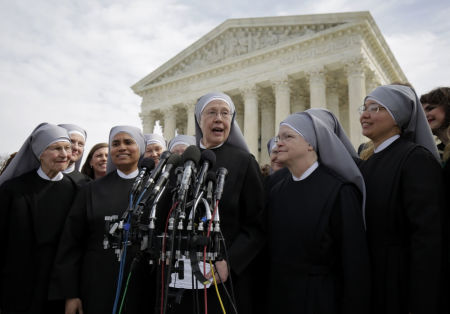Supreme Court upholds Trump rule exempting Little Sisters from HHS birth control mandate

The U.S. Supreme Court has upheld a Trump administration rule broadening religious exemptions to the Department of Health and Human Services contraceptive coverage mandate.
In a decision released Wednesday morning, the high court ruled that the exemption, which was aimed at protecting groups like the Little Sisters of the Poor, was constitutional.
Justice Clarence Thomas authored the majority opinion, being joined by Chief Justice John Roberts, and Justices Samuel Alito, Neil Gorsuch, and Brett Kavanaugh. Justice Elena Kagan filed a concurring opinion, being joined by Justice Stephen Breyer.
The majority opinion reversed a lower appeals ruling against the Trump administration rule and dissolved a nationwide injunction against its enforcement.
“The only question we face today is what the plain language of the statute authorizes. And the plain language of the statute clearly allows the Departments to create the preventive care standards as well as the religious and moral exemptions,” wrote Thomas.
"[W]e made it abundantly clear that, under RFRA (Religious Freedom Restoration Act), the Departments must accept the sincerely held complicity-based objections of religious entities. That is, they could not 'tell the plaintiffs that their beliefs are flawed' because, in the Departments’ view, 'the connection between what the objecting parties must do ... and the end that they find to be morally wrong ... is simply too attenuated.'”
In a concurring opinion, Justices Samuel Alito and Neil Gorsuch said that "the contraceptive mandate imposes a substantial burden on any employer who, like the Little Sisters, has a sincere religious objection to the use of a listed contraceptive and a sincere religious belief that compliance with the mandate (through the accommodation or otherwise) makes it complicit in the provision to the employer’s workers of a contraceptive to which the employer has a religious objection."
They also noted: "The Court has held that there is a constitutional right to purchase and use contraceptives. But the Court has never held that there is a constitutional right to free contraceptives."
Justice Ruth Bader Ginsburg authored a dissenting opinion, being joined by Justice Sonia Sotomayor, claiming the majority opinion allowed “the religious beliefs of some to overwhelm the rights and interests of others who do not share those beliefs.”
“… this Court leaves women workers to fend for themselves, to seek contraceptive coverage from sources other than their employer’s insurer, and, absent another available source of funding, to pay for contraceptive services out of their own pockets,” wrote Ginsburg.
Under the Affordable Care Act, the contraceptive mandate requires employers to provide contraceptive coverage to their employees through their group health plans.
In 2017, the Trump administration decided to broaden religious exemption to the HHS mandate to better accommodate groups like the Little Sisters.
In response, Pennsylvania and California sued the federal government over the new broader exemption, with Delaware, Maryland, New York, and Virginia joining California's litigation.
The Little Sisters, who had been waging a legal battle against the HHS mandate for years, filed a motion to intervene on the litigation, arguing that the states were threatening their rights.
Last July, a three judge panel of the U.S. Court of Appeals for the Third Circuit unanimously ruled to uphold a lower court decision enjoining the new rules nationwide.
Circuit Judge Patty Shwartz wrote the panel opinion, arguing that the Religious Freedom Restoration Act did not apply to the case, as the current accommodation process was sufficient.
“RFRA does not require the broad exemption embodied in the Final Rule nor to make voluntary a notice of the employer’s decision not to provide such coverage to avoid burdening those beliefs,” wrote Shwartz.
“… the status quo prior to the new Rule, with the Accommodation, did not infringe on the religious exercise of covered employers, nor is there a basis to conclude the Accommodation process infringes on the religious exercise of any employer.”
The case was consolidated with Trump v. Pennsylvania, with oral arguments held in May telephonically due to efforts to curb the spread of COVID-19.
Diana Verm, senior counsel at Becket Law who listened to the oral arguments, told The Christian Post at the time that she thought the oral arguments “went very well.”
“You could hear the justices seeking a way to resolve this longstanding dispute,” she explained to CP in May. “I do think that at the end of the day that they will rule in favor of the Little Sisters and I think the big question that we are asking now is how they will do that.”
“No one had an argument, none of the justices and none of the counsels for Pennsylvania had a good argument for why that exemption shouldn’t apply to the Little Sisters.”






















